Disease
A disease is a condition that impairs the normal functioning of an organism. It can be caused by a variety of factors, including pathogens such as bacteria, viruses, and fungi, as well as genetic mutations, environmental factors, and lifestyle choices.
Types of Diseases
- Infectious Diseases: Caused by pathogenic microorganisms, such as bacteria, viruses, fungi, and parasites. Examples include influenza, tuberculosis, and HIV/AIDS.
- Chronic Diseases: Long-lasting conditions that can be controlled but not cured, such as diabetes, heart disease, and cancer.
- Autoimmune Diseases: Conditions in which the immune system mistakenly attacks the body's own cells, such as rheumatoid arthritis and lupus.
- Genetic Diseases: Result from abnormalities in an individual's genetic material, such as cystic fibrosis and sickle cell anemia.
Causes of Diseases
Diseases can be caused by a variety of factors, including:
- Pathogens: Microorganisms that can cause disease, including bacteria, viruses, fungi, and parasites.
- Genetic Mutations: Abnormal changes in an organism's DNA that can lead to genetic diseases.
- Environmental Factors: Exposure to pollutants, toxins, and harmful substances in the environment.
- Lifestyle Choices: Factors such as diet, exercise, smoking, and alcohol consumption can impact the risk of certain diseases.
Prevention and Treatment
Preventing and treating diseases often involves a combination of strategies, including:
- Vaccination: Immunization against infectious diseases to prevent their spread.
- Healthy Lifestyle: Eating a balanced diet, exercising regularly, and avoiding harmful substances.
- Medication: Pharmaceutical drugs and treatments to manage symptoms and cure or control diseases.
- Public Health Measures: Strategies such as sanitation, hygiene, and disease surveillance to prevent and control the spread of diseases.
Study Tips
To study the topic of disease, consider the following tips:
- Understand the different types of diseases and their causes.
- Review specific examples of infectious, chronic, autoimmune, and genetic diseases.
- Learn about the prevention and treatment strategies for various diseases.
- Consider the impact of lifestyle choices and environmental factors on disease risk.
- Explore current research and advancements in the field of disease prevention and treatment.
◂Science Worksheets and Study Guides Eighth Grade. The Digestive System & Nutrition
Study Guide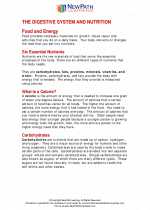 The Digestive and nutrition
The Digestive and nutrition  Worksheet/Answer key
Worksheet/Answer key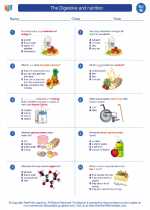 The Digestive and nutrition
The Digestive and nutrition  Worksheet/Answer key
Worksheet/Answer key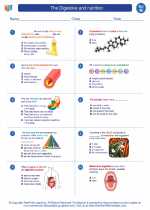 The Digestive and nutrition
The Digestive and nutrition  Worksheet/Answer key
Worksheet/Answer key The Digestive and nutrition
The Digestive and nutrition  Vocabulary/Answer key
Vocabulary/Answer key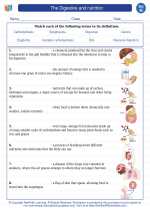 The Digestive and nutrition
The Digestive and nutrition  Vocabulary/Answer key
Vocabulary/Answer key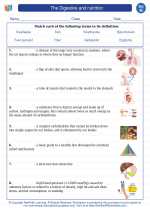 The Digestive and nutrition
The Digestive and nutrition  Vocabulary/Answer key
Vocabulary/Answer key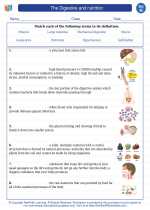 The Digestive and nutrition
The Digestive and nutrition  Vocabulary/Answer key
Vocabulary/Answer key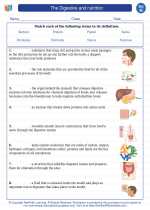 The Digestive and nutrition
The Digestive and nutrition  Vocabulary/Answer key
Vocabulary/Answer key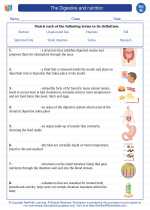 The Digestive and nutrition
The Digestive and nutrition 

 Worksheet/Answer key
Worksheet/Answer key
 Worksheet/Answer key
Worksheet/Answer key
 Worksheet/Answer key
Worksheet/Answer key
 Vocabulary/Answer key
Vocabulary/Answer key
 Vocabulary/Answer key
Vocabulary/Answer key
 Vocabulary/Answer key
Vocabulary/Answer key
 Vocabulary/Answer key
Vocabulary/Answer key
 Vocabulary/Answer key
Vocabulary/Answer key

The resources above cover the following skills:
Reading Standards for Literacy in Science and Technical Subjects
Craft and Structure
Determine the meaning of symbols, key terms, and other domain-specific words and phrases as they are used in a specific scientific or technical context relevant to grades 6-8 texts and topics.